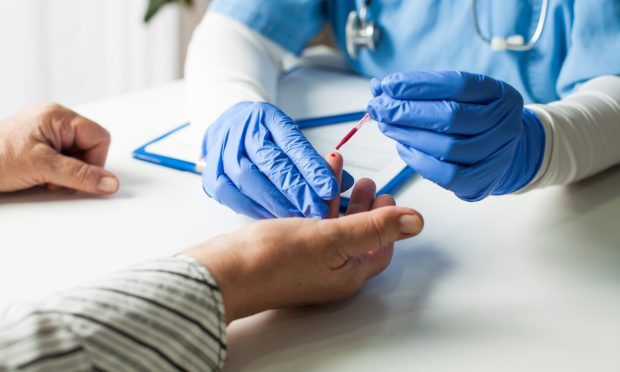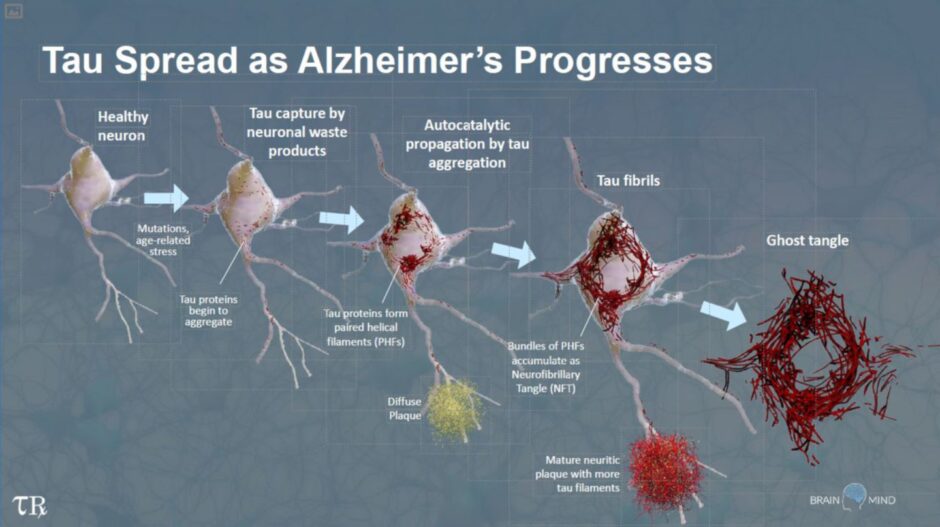TauRx, Aberdeen’s pioneering Alzheimer’s research company, has hailed a new NHS project that could led to earlier diagnoses of the degenerative disease.
The Blood Biomarker Challenge, announced last week, aims to get blood tests for Alzheimer’s available through the NHS within five years.
Research groups behind the project said the blood tests will diagnose Alzheimer’s disease earlier and more accurately than current methods.
TauRx, which is headquartered on King Street in Aberdeen, is developing an Alzheimer’s treatment that has already been shown to slow down the progress of Alzheimer’s disease.
Speaking to the Press and Journal in September, the co-founder of the company, Claude Wischik, said the treatment is more effective if used earlier as it can only slow down the disease, not reverse it.
Speaking today (Monday November 13), Sonya Miller, medical oversight lead for TauRx, called the NHS Blood Biomarker Challenge “an important opportunity” to improve access to Alzheimer’s treatment.
“Blood tests have the potential to be readily accessible across a broad spectrum of eligible populations, delivering significant benefits to the NHS while improving the lives of people with Alzheimer’s, as well as the experience of those that care for them.”
Alzheimer’s disease is the most common cause of dementia and causes people to experience memory loss and other cognitive difficulties.
It is set to affect more than a million Britons by the middle of this century.
TauRx studies show brain function improves with drug
Professor Wischik helped set up TauRx in 2002 after observing abnormal fibres of protein called tau causing “tangles” in the brains of Alzheimer’s patients.
In trials last year, participants taking the TauRx drug experienced a slowdown in the rate of memory loss and other functional impairments when compared to other sufferers of the disease.
Since then, preliminary trials have shown that brain function actually improves if the treatment is taken early enough.
“We already know that a new generation of treatments in late-stage development have potential to deliver transformational effects for patients living with the condition, but the effects of these drugs are enhanced if indicators like the presence of tau proteins in the blood are caught early enough,” Dr Miller said today.
“Fortunately, like treatments themselves, diagnostic methodologies are developing rapidly.
“Part of TauRx’s investment in diagnostics includes advancing work on specific core tau biomarkers to identify and monitor individuals who could benefit most from new treatments and to monitor the impact of therapy.”
NHS test will be low-cost and simple to use
The NHS blood test project is being headed by Alzheimer’s research groups Alzheimer’s Research UK and the Alzheimer’s Society.
The National Institute of Health and Care Research, the government body that funds health care research, is also involved.
Susan Kohlhaas, executive director of research and partnerships at Alzheimer’s Research UK, said: “We’re sitting on the cusp of a new era of dementia treatments, and doctors are likely going to see more people coming forward for a diagnosis.
“But the NHS doesn’t possess the required levels of diagnostic infrastructure to cope with this growing demand.
“Low-cost tools like blood tests that are non-invasive and simpler to administer than current gold standard methods are the answer to this.”




Conversation